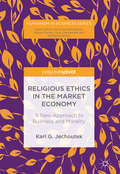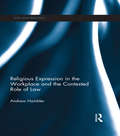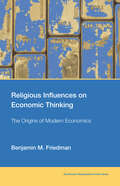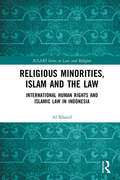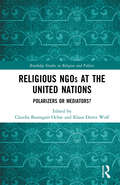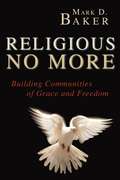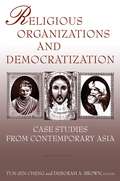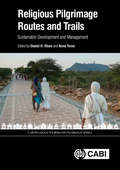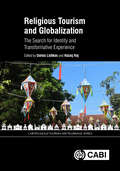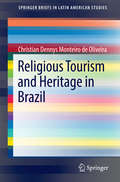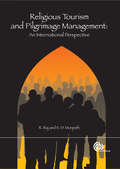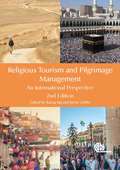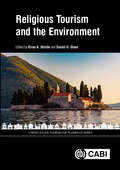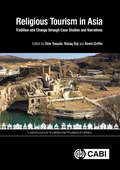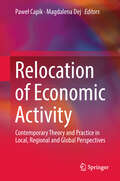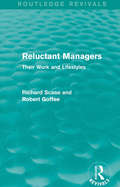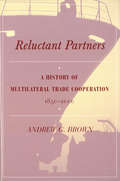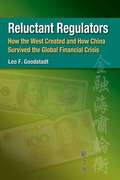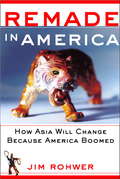- Table View
- List View
Religious Ethics in the Market Economy: A New Approach To Business And Morality (Humanism In Business Ser.)
by Karl G. JechoutekThis book aims to go beyond merely confrontational or complementary treatments of the relationship between market participation and business ethics. Reviewing the attitudes towards the market embedded in religious ethics and scholars, it explores the symbiotic relationship between the economy, ethics and morals. Moving the discussion beyond a static and traditional economy envisaged by scripture, it explores the impact of an evolving and globalised economy based on the value systems of moral philosophy and religious ethics. The Author aims to expand the conventional view of business ethics, encouraging readers to interpret markets and morality as intertwined concepts, and use them to inform further research.
Religious Expression in the Workplace and the Contested Role of Law (Law and Religion)
by Andrew HamblerThe workplace is a key forum in which the issue of religion and its position in the public sphere is under debate. Desires to observe and express religious beliefs in the workplace can introduce conflict between employees and employers. This book addresses the role the law plays in the resolution of these potential conflicts. The book considers the definition and underlying motives of religious expression, and explores the different ways it may impact the workplace. Andrew Hambler identifies principled responses to workplace religious expression within a liberal state and compares this to the law applying in England and Wales and its interpretation by courts and tribunals. The book determines the extent to which freedom of religious expression for the individual enjoys legal protection in the workplace in England and Wales, and asks whether there is a case for changing the law to strengthen that protection. The book will be of great use and interest to scholars and students of religion and the law, employment law, and religion and human rights.
Religious Influences on Economic Thinking: The Origins of Modern Economics (Karl Brunner Distinguished Lecture Series)
by Benjamin M. FriedmanHow religious thinking was—and remains—a central influence shaping economics.The conventional view of economics is that the field was a product of the Enlightenment and, therefore, bore no relation to religious ideas. But is this true? In Religious Influences on Economic Thinking, Benjamin Friedman shows that religious thinking was, in fact, a powerful force in shaping the initial development of modern Western economics and that it has remained an influence on economic thinking ever since. Friedman argues that an important influence enabling the insights of Adam Smith and his contemporaries was the new and highly controversial line of religious thinking at that time in the English-speaking Protestant world.Friedman explains that the influence of religious thinking on modern economic thought at the field&’s inception established resonances that have persisted through the subsequent centuries, even as the economic context has evolved and the questions economists ask have shifted along with it. Because we are largely not conscious of these influences, neither in the past nor as they are at work today, we are sometimes puzzled when we stumble across evidence of them—for example, in the otherwise hard-to-explain attitudes that many of our fellow citizens express on issues like estate taxes, business regulation, and environmental restrictions. But they are still at work. Understanding them can only enhance the economics profession&’s capacity to contribute to our ongoing public discussion of the important questions on which the discipline so usefully bears.
Religious Liberties for Corporations?: Hobby Lobby, the Affordable Care Act, and the Constitution
by David H. Gans Ilya ShapiroAn expanded version of a series of debates between the authors, this book examines the nature of corporate rights, especially with respect to religious liberty, in the context of the controversial Hobby Lobby case from the Supreme Court's 2013-14 term.
Religious Liberty
by Williams Robinson Daniel N. Richard N.What are the rights of religious institutions? Should those rights extend to for-profit corporations? Houses of worship have claimed they should be free from anti-discrimination laws in hiring and firing ministers and other employees. Faith-based institutions, including hospitals and universities, have sought exemptions from requirements to provide contraception. Now, in a surprising development, large for-profit corporations have succeeded in asserting rights to religious free exercise. The Rise of Corporate Religious Liberty explores this "corporate" turn in law and religion. Drawing on a broad range perspectives, this book examines the idea of "freedom of the church," the rights of for-profit corporations, and the implications of the Supreme Court's landmark decision in Burwell v. Hobby Lobby for debates on anti-discrimination law, same-sex marriage, health care, and religious freedom.
Religious Minorities, Islam and the Law: International Human Rights and Islamic Law in Indonesia (ICLARS Series on Law and Religion)
by Al KhanifThis book examines the legal conundrum of reconciling international human rights law in a Muslim majority country and identifies a trajectory for negotiating the protection of religious minorities within Islam. The work explores the history of religious minorities within Islam in Indonesia, which contains the world’s largest Muslim population, as well as the present-day ways by which the government may address issues through reconciling international human rights law and Islamic law. Given the context of multiple sets of religious norms in Indonesia, this is a complicated endeavour. In addition to amending and enacting human rights norms, the government is also negotiating with the long history of Islamisation in Indonesia. Particularly relevant is the practice of customary law, which puts the rights of community over individualism. This practice directly affects the rights of religious minorities within Islam. Readers, especially those conducting research, will also be provided with information and references which are relevant to the field of human rights, especially in relation to religious minorities and international law. The book will be a valuable resource for academics and researchers in the fields of International Human Rights Law, Law and Religion, and Islamic Studies.
Religious NGOs at the United Nations: Polarizers or Mediators? (Routledge Studies in Religion and Politics)
by Klaus Dieter Wolf Claudia Baumgart-OchseExamining the involvement of religious NGOs (RNGOs) at the UN, this book explores whether they polarize political debates at the UN or facilitate agreement on policy issues. The number of RNGOs engaging with the United Nations (UN) has grown considerably in recent years: RNGOs maintain relations with various UN agencies, member-state missions, and other NGOs, and participate in UN conferences and events. This volume includes both a quantitative overview of RNGOs at the UN and qualitative analyses of specific policy issues such as international development, climate change, business and human rights, sexual and reproductive health and rights, international criminal justice, defamation of religions, and intercultural dialogue and cooperation. The contributions explore the factors that explain the RNGOs’ normative positions and actions and scrutinise the assumption that religions introduce non-negotiable principles into political debate and decision-making that inevitably lead to conflict and division. Presenting original research on RNGOs and issues of global public policy, this volume will be relevant to both researchers and policy-makers in the fields of religion and international relations, the United Nations, and non-state actors and global governance.
Religious No More: Building Communities of Grace and Freedom
by Mark D. BakerToo many Christians are religious - their faith is more a human endeavor than a response to God's loving initiative. Such religion assumes that our value comes not from God but from what we do. It absorbs principles and postulates from the surrounding society, leading to further misconceptions about God and our relation to our Creator. All this hinders people from experiencing vibrant Christian community, where they could freely love and be loved. The author suggests that just as car companies test automobiles under severe conditions to uncover weaknesses, North American Christians may detect fallacies in their gospel by examining how it plays out under the challenges of poverty, injustice, and entrenched religiosity. His test case is drawn from his ten-year missionary experience in Tegucigalpa, Honduras, at churches born out of North American mission work. He observes Honduran church life, draws parallels to the dangers of religion in the North American church and mines from Galatians exciting possibilities of robust Christian grace and freedom. The result is a bracing and refreshing approach to Christian community for laypersons, pastors, missionaries, and mission strategists.
Religious Organizations and Democratization: Case Studies from Contemporary Asia
by Tun-jen Cheng Deborah A. BrownSince the terrorist attacks on 9/11, the political roles of religious institutions and groups have captured inernational attention. This book examines how religious institutions and organizations in various Asian countries are influencing democratic development and the shaping of government policies. Religious Organizations and Democratization covers Taiwan, Hong Kong, Mainland China, Korea, Thailand, the Philippines, Malaysia, Indonesia, and Japan. The chapters specifically address the engagement of Christian, Buddhist, Muslim, and other religious organizations in the advancement and/or hindrance of democratization in the region. The contributors consider such questions as: Why have some religious organizations played a decisive role in democratic transitions, while others remained politically dormant, and other still acted in conservative alliances to block democratic development? Why did some religious organizations that once were active and instrumental to democratic change lose their political vitality as soon as civil liberties were successfully introduced? And why did other religious organizations, irrespective of their roles in the process of democratic transition, emerge as key political forces in the civil society?
Religious Pilgrimage Routes and Trails: Sustainable Development and Management (CABI Religious Tourism and Pilgrimage Series)
by Rana P. Singh Dallen J. Timothy Jaeyeon Choe Dr Daniel H Olsen Associate Professor Anna Trono Raffaella Afferni Stephen William Boyd Valentina Castronuovo Tomasz Duda Vreny Enongene Carla Ferrario Paul R. Fidgeon Brian J. Hill Michael Hitchcock Marco Leo Imperiale Darius Liutikas Rubén C. Lois-González Pravin S. Rana Pilar Taboada-de-Zúñiga Romero Rodrigo Espinoza Sanchez Xosé M. Santos Kiran A. Shinde Gabriella Trombino Greg WilkinsonFor millennia people have travelled to religious sites for worship, initiatory and leisure purposes. Today there are hundreds, if not thousands, of religious pilgrimage routes and trails around the world that are used by pilgrims as well as tourists. Indeed, many religious pilgrimage routes and trails are today used as themes by tourism marketers in an effort to promote regional economic development. Providing a holistic approach to religious pilgrimage routes and trails, this book: - Addresses important conceptual themes such as sustainable local development, regional economic development, heritage identity and management, and promoting environmentally friendly practices; - Includes global case studies to help transfer theory into good practice; - Calls for further discussion of the importance of better planning, management, and maintenance of these routes and trails, so that the positive benefits of this type of tourism development can be fully realized. An important resource for those interested in religious tourism and pilgrimage, this book is also an invaluable collection for academics and policy-makers within heritage tourism and regional development.
Religious Pilgrimage Routes and Trails: Sustainable Development and Management (CABI Religious Tourism and Pilgrimage Series)
by Rana P. Singh Dallen J. Timothy Jaeyeon Choe Dr Daniel H Olsen Associate Professor Anna Trono Raffaella Afferni Stephen William Boyd Valentina Castronuovo Tomasz Duda Vreny Enongene Carla Ferrario Paul R. Fidgeon Brian J. Hill Michael Hitchcock Marco Leo Imperiale Darius Liutikas Rubén C. Lois-González Pravin S. Rana Pilar Taboada-de-Zúñiga Romero Rodrigo Espinoza Sanchez Xosé M. Santos Kiran A. Shinde Gabriella Trombino Greg WilkinsonFor millennia people have travelled to religious sites for worship, initiatory and leisure purposes. Today there are hundreds, if not thousands, of religious pilgrimage routes and trails around the world that are used by pilgrims as well as tourists. Indeed, many religious pilgrimage routes and trails are today used as themes by tourism marketers in an effort to promote regional economic development. Providing a holistic approach to religious pilgrimage routes and trails, this book: - Addresses important conceptual themes such as sustainable local development, regional economic development, heritage identity and management, and promoting environmentally friendly practices; - Includes global case studies to help transfer theory into good practice; - Calls for further discussion of the importance of better planning, management, and maintenance of these routes and trails, so that the positive benefits of this type of tourism development can be fully realized. An important resource for those interested in religious tourism and pilgrimage, this book is also an invaluable collection for academics and policy-makers within heritage tourism and regional development.
Religious Tourism and Globalization: The Search for Identity and Transformative Experience (CABI Religious Tourism and Pilgrimage Series)
by Dr Nour Farra-Haddad Vitor Ambrósio Alison T. Smith Jaffer Idris Dimitrios Mylonopoulos Ricardo Nicolas Progano Silvia Aulet Serrallonga Spyridon Parthenis Dr Dino Bozonelos Polyxeni Moira Caglar Bideci Mujde Bideci Elzbieta Bilska-Wodecka Stephen F. Haller Antonietta Ivona Isilda Leitão Eleanor O’Keeffe Donatella PriviteraIs it possible to identify the positive and negative effects of globalization on religious tourism or to estimate the transformation of the internal and external constructs of pilgrimage by these effects? In order to address these questions, this book highlights the importance of the search for identity and transformative experience during religious tourism. It also looks at how, recently, globalization has played a part in the changes of the concept of personal and social identity and the transformative experience of pilgrimage. The chapters, consisting of carefully selected case studies, analyse possible effects including the adoption of different new rituals, new pilgrims' values, changes of tradition, acceptance of technologic innovations, development of new business models, and other environmental and sociocultural changes. The book provides: · a conceptual framework for understanding the impacts of globalization; · integrated cross-disciplinary approaches; and · an insight into major religious travel practices in the age of identity challenges and worldwide transformations. It will be suitable for researchers and students of religious tourism, pilgrimage, identity tourism, as well as related subjects such as sociology, anthropology, psychology, theology, history and cultural studies.
Religious Tourism and Heritage in Brazil
by Christian Dennys Monteiro OliveiraThe book reflects on the current dimensions of tourism and patrimony in Brazil. It presents cultural realities as resources for the resolution of tensions between different communities and the establishment of their identities. The book also presents memories and forgotten traditions that are important in the representation of places and cultures. It questions religious systems and their dynamic interface with the occupation of cultural spaces and the interpretation of touristic practices in Brazil. The topics discussed include pilgrimages, sanctuaries, symbolic vectors, and religious festivals.
Religious Tourism and Pilgrimage Festivals Management: An International Perspective
by Razaq Raj Nigel D. MorpethIn case studies, researchers in tourism from Europe, China, Australia, and Canada present personal, theoretical, and empirical insights into pilgrimage, religion, and tourism. They explore increasing linkages and interconnections between shared sacred and secular spaces; religious and pilgrimage activity related to ancient, sacred, and emerging tourist destinations; and new forms of pilgrimage, faith systems, and quasi-religious activities.
Religious Tourism and Pilgrimage Management: An International Perspective (2nd Edition)
by Razaq Raj Neil Robinson Ian Rotherham Alan Clarke Dr Nour Farra-Haddad Carlos Fernandes Silvia Aulet Vitor Ambrósio Elizabeth Ifeyinwa Benson Nigel Bond Miguel Brázio Geoffrey Skoll Dr Dolors Vidal Ruth Blackwell Hadil Faris Dr Maria Leppakari Michael O’ Regan Yasin Bilim Jorge Coelho Jaeyeon Choe Tahir Rashid Samson Olawale Fadare Sevde Düzgüner Maximiliano Korstanje Lluis Prats Vincent Zamitt Anna Trono Kevin Griffin Agnes RaffayWithin the past 10 years 'Religious Tourism' has seen both economic and education-sector growth on a global scale. This book addresses the central role of religious tourism and interrelationships with other aspects of pilgrimage management. It provides practical applications, models and illustrations and looks at secular and sacred spaces on a global stage. The second edition sees the introduction of a new structure and the addition of new international case studies. It is an invaluable reference for academics, students and practitioners and is a timely text on the future of faith-based tourism and pilgrimage.
Religious Tourism and Pilgrimage Management: An International Perspective (Cabi Religious Tourism And Pilgrimage Ser.)
by Neil Robinson Ian Rotherham Alan Clarke Dr Nour Farra-Haddad Carlos Fernandes Silvia Aulet Vitor Ambrósio Elizabeth Ifeyinwa Benson Nigel Bond Miguel Brázio Geoffrey Skoll Ruth Blackwell Hadil Faris Dr Maria Leppakari Michael O’ Regan Yasin Bilim Jorge Coelho Jaeyeon Choe Tahir Rashid Samson Olawale Fadare Sevde Düzgüner Lluis Prats Vincent Zamitt Agnes Raffay Associate Professor Anna Trono Professor Maximiliano Korstanje Dr Dolors Vidal-CasellasWithin the past 10 years 'Religious Tourism' has seen both economic and education-sector growth on a global scale. This book addresses the central role of religious tourism and interrelationships with other aspects of pilgrimage management. It provides practical applications, models and illustrations and looks at secular and sacred spaces on a global stage. The second edition sees the introduction of a new structure and the addition of new international case studies. It is an invaluable reference for academics, students and practitioners and is a timely text on the future of faith-based tourism and pilgrimage.
Religious Tourism and the Environment (CABI Religious Tourism and Pilgrimage Series)
by Kiran A. Shinde and Daniel H. OlsenThe remarkable growth in religious tourism across the world has generated considerable interest in the impacts of this type of tourism. Focusing here on environmental issues, this book moves beyond the documentation of environmental impacts to examine in greater depth the intersections between religious tourism and the environment. Beginning with an in-depth introduction that highlights the intersections between religion, tourism, and the environment, the book then focuses on the environment as a resource or generator for religious tourism and as a recipient of the impacts of religious tourism. Chapters included discuss such important areas as theological views, environmental responsibility, and host perspectives. Covering as many cultural and environmental regions as possible, this book provides: -An in-depth yet holistic view of the relationships between religious tourism and the environment; -A conceptual framework that goes beyond listing potential environment impacts; -A strong focus on explaining the universality of the deeper environmental issues surrounding sacredness and sacred places; -A discussion of the role of disease and health-related issues at mass religious gatherings. From a global writing team and featuring case studies spanning Europe and Asia, this book will be of great interest to researchers and students of tourism and religious studies, as well as those studying environmental issues.
Religious Tourism in Asia: Tradition and Change through Case Studies and Narratives (CABI Religious Tourism and Pilgrimage Series)
by Razaq Raj Kevin Griffin Dr Shin YasudaThe Asia-Pacific region is considered the world's religious core, with the greatest number of pilgrims and travellers to religious events for both international and domestic tourism. It is estimated that there are approximately 600 million national and international religious and spiritual voyages in the world, of which over half take place in Asia. This book focuses on tourism and sacred sites in Asia. Contemporary case studies of religious and pilgrimage activities provide key learning points and present practical examples from this 'hub' of pilgrimage destinations. They explore ancient, sacred and emerging tourist destinations and new forms of pilgrimage, faith systems and quasi-religious activities. It will be of interest to researchers within religious, cultural, heritage and Asian tourism. Key features include: - An Asian perspective on a growing area of tourism. - Case studies from across the continent. - Full-colour images of pilgrimage sites and key destinations bring the topic to life.
Religious Tourism in Asia: Tradition and Change through Case Studies and Narratives (CABI Religious Tourism and Pilgrimage Series)
by Razaq Raj Kevin Griffin Shin YasudaThe Asia-Pacific region is considered the world's religious core, with the greatest number of pilgrims and travellers to religious events for both international and domestic tourism. It is estimated that there are approximately 600 million national and international religious and spiritual voyages in the world, of which over half take place in Asia. This book focuses on tourism and sacred sites in Asia. Contemporary case studies of religious and pilgrimage activities provide key learning points and present practical examples from this 'hub' of pilgrimage destinations. They explore ancient, sacred and emerging tourist destinations and new forms of pilgrimage, faith systems and quasi-religious activities. It will be of interest to researchers within religious, cultural, heritage and Asian tourism. Key features include: - An Asian perspective on a growing area of tourism. - Case studies from across the continent. - Full-colour images of pilgrimage sites and key destinations bring the topic to life.
Relocation of Economic Activity: Contemporary Theory and Practice in Local, Regional and Global Perspectives
by Paweł Capik Magdalena DejThis timely volume provides a thorough analysis of current trends in location and relocation of economic activity globally, regionally and locally. Using robust empirical material this book offers a multidisciplinary, comprehensive overview, critique and extension of long-established theories underpinning patterns of firm (re)location. It explores dominant trends in the mobility and relocation of industries and firms, examines the factors guiding such trends and evaluates their consequences in both developed and emerging economies in Europe, Asia and Latin America.This book will be appreciated by diverse audiences. Geography and regional science researchers of ‘economic activity location’ can engage with the critical appraisal of key theoretical concepts and an analysis of recent empirical data. Students of human and economic geography, planning, regional development, and global supply chain management in senior years of undergraduate programmes and completing postgraduate degrees will appreciate the accessible language, multiple examples and graphical illustrations of theoretical frameworks underpinning location and relocation of firms and industries, and its consequences. Practitioners, including local and regional policy makers and location consultants will enjoy the comparative discussion of solutions and practices adopted in localities, regions and countries as diverse as China, Brazil, The Netherlands and Poland.
Reluctant Managers: Their Work and Lifestyles (Routledge Revivals)
by Robert Goffee Richard Scase‘The manager’ is a crucial figure in debates about the future of the British economy in general and the working practices of private and public organizations in particular. He or she is to be encouraged, cajoled, exhorted or at worst obliged to pursue organizational goals of greater economy, efficiency and effectiveness. Richard Scase and Robert Goffee examine the lives of managers in this study, first published in 1989. The information in the book comes from in-depth interviews with men and women in both private and public sector organizations. The authors also explore managers’ feelings towards their work and home lives, and where their strongest alliances lie. The book reveals that, under increasing pressures at work and changing expectations at home, managers are fundamentally reluctant to fulfil the committed entrepreneurial roles that many optimistically have been allocating to them. This book is ideal for students of business and management.
Reluctant Partners
by Andrew G. BrownWith globalization drawing countries closer together, greater international cooperation is essential for peace and stability. The collective arrangement made by governments to manage their trade relations is one of the few successes of globalization. This book assesses the progress of multilateral trade cooperation, exploring the interests at work and the issues raised in successive postwar rounds of negotiations. It traces how the narrow perception of reciprocity has gradually yielded to a broader evaluation of the benefits to the regime as a whole as the major trading nations have mutually reduced trade barriers. Andrew G. Brown demonstrates the increasing importance of rule making and shows the diversity of issues on which negotiations have focused, such as customs procedures, technical standards, subsidies, anti-dumping duties, intellectual property rights, and the treatment of foreign direct investment. Despite the progress, however, the regime has remained vulnerable. The book also analyzes the major sources of strain that have been evident. This is a nontechnical book for those curious about the possibilities for cooperation among states and should be of interest to both the nonspecialist and the specialist. It draws on more than one discipline to interpret the events, lying in the triangle bounded by political science, economics, and history.
Reluctant Regulators
by Leo F. GoodstadtIn a work partially funded by the Hong Kong Institute for Monetary Research, Goodstadt explores why American and British financial officials were reluctant to intervene when confronted with evidence that their financial stability was in danger. Four case studies describe China's experiences during the 1997-1998 Asian financial crisis, the impact of the recent global financial crisis on the Chinese banking industry, and Beijing's use of Hong Kong as a force for modernizing its major banks and corporate practices. Distributed in the U. S. by the U. of Washington Press. Annotation ©2011 Book News, Inc. , Portland, OR (booknews. com)
Remade in America
by Jim RohwerIn a stunning rebuke to a large group of naysayers, Jim Rohwer convincingly argues that the Asian financial crisis of 1997-1998 was not a turn for the worse; rather it was short-lived and helped rid Asian markets of many of the problems that were holding it back. Now, while most analysts go wild over the American economy, Rohwer provides the key insights into why America is due for a slowdown while Asia is poised for tremendous growth and opportunity. Jim Rohwer has long experience in Asia as both a journalist and a business executive. The highly informed account in Remade in America comes from his own on-the-ground observation and analysis, as well as knowing all the major players in business, government, and the media in both America and Asia. Telling, in-depth interviews with people ranging from Lee Kuan Yew, the former prime minister of Singapore, and Jack Welch, the CEO of General Electric, result in deep insights into Asia's great potential.The future of Asia is as much about the United States as it is about Asia, for the forces that revolutionized the American economy in the last twenty years provide the clues for what is to come in Asia. The key to Asian growth is understanding how Asian companies have learned from the strengths of both American and Asian business models. Remade in America clearly charts how Asian industries have started managing themselves based on American standards of corporate, technological, and economic performance that began to be adopted in the late 1990s, while incorporating their own strengths of cooperative corporate and social organization. Asia is ideally suited to take advantage of the Internet revolution, and we are only now starting to see its enormous potential in this area. Rohwer's insightful analysis of Japan, China, Taiwan, South Korea, and Southeast Asia shows how, as these countries start to combine the ruthlessly efficient market democracy and accountability that America pioneered with the Asian domination of dispersed manufacturing and assembly of components, there will be major opportunities both for American corporations and for investors. In addition, technology will not only enable Asian economies to improve on their traditional strengths, it will also help Asia greatly improve its traditional poor performance in services and distribution.Remade in America is a provocative and useful book, not only for those with direct business interests in Asia but also for readers who want an informed look at this dynamic and important part of the world. There will be a new Asia, Inc., one in which such matters as finance and technology will be handled in an American way while people will be managed along Asian lines in their interactions -- a powerful combination that we ignore at our peril.
Remain Authentic--but Conform Enough: How to Be a More Effective Leader
by Gareth Jones Rob GoffeeLeaders who succeed in changing organizations challenge the norms--but rarely all of them, all at once. This chapter focuses on reading organizational context and understanding the complex social architecture to which the leader must adapt in order to gain traction in an organization.
